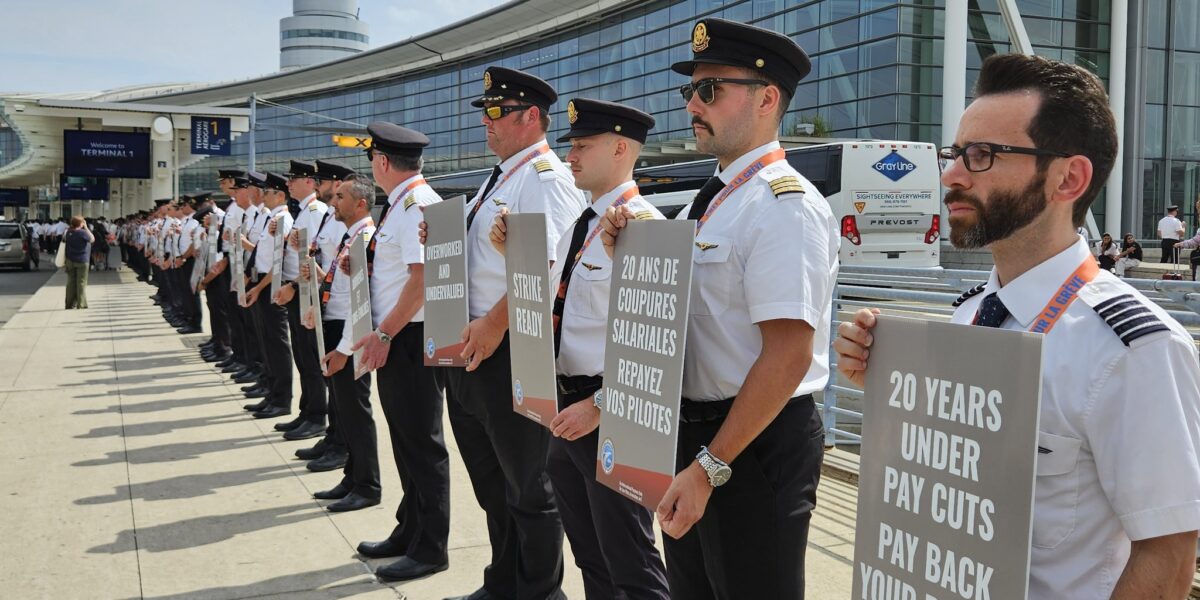The Air Line Pilots Association (ALPA) reached a tentative deal with Air Canada early Sunday morning, averting a strike. Air Canada has announced there will be no service disruptions and the union has said the agreement would generate more than $1 billion in value for pilots of the course of the deal. However, labour experts remain concerned by the way business leaders have consistently turned to the government to step in during collective bargaining.
On Thursday, leaders from various business lobby groups including the Business Council of Canada, convened at the Shaw Centre in Ottawa to call on the government to prevent an airline strike. A day later, Air Canada released a statement urging the government to call for binding arbitration to avoid a travel disruption.
“It’s pathetic,” said D.T. Cochrane, Senior Economist for the Canadian Labour Congress. “These are people who supposedly believe in the power of the market and that bargaining between workers and employers is supposed to happen at the bargaining table. The moment they feel like the channel they supposedly support is not going to deliver the outcome they want to see, they go running to the government.”
While calling for binding arbitration, Air Canada said they remained committed to reaching a deal at the table, but the risks associated with a disruption were too high for the government to not intervene should talks fail.
A disruption and binding arbitration were both avoided when the ALPA and Air Canada reached a tentative agreement. Still, calls for binding arbitration were publicized, adding to a concerning trend in Canadian labour relations.
In August, the federal government forced binding arbitration when workers at the Canadian National Railway (CN) and Canadian Pacific Kansas City (CPKC).
Read more: Locked out rail workers are demanding improved safety
Labour Minister Steve Mackinnon used section 107 of the Canadian Labour Code to force workers off the picket line. Under section 107, the labour minister “may do such things as to the minister seem likely to maintain or secure industrial peace and to promote conditions favourable to the settlement of industrial disputes or differences and to those ends the minister may refer any question to the board or direct the board to do such things as the minister deems necessary.”
This way of forcing binding arbitration was met with backlash. Some said the federal government had used the Canada Industrial Relations Board to their own benefit. The Teamsters union, which represented locked out railway workers, called the decision shameful.
“The two major railways in Canada manufactured this crisis, took the country hostage, and manipulated the government to once again disregard the rights afforded to working-class Canadians,” said Paul Boucher, President of the Teamsters Canada Rail Conference.
While negotiations with Air Canada did not end up going to binding arbitration, union members still saw the actions from business leaders as disrespectful to workers rights.
“The Canadian economy is being weaponized to force potential binding arbitration to circumvent our constitutional rights under the Canada Labour Code and stop free collective bargaining,” said Charlene Hudy, from ALPA’s Air Canada Master Executive Council. “Government interference in the bargaining process tips the scales in the favour of corporations, hindering workers’ ability to achieve a Collective Agreement that reflects the work they do; work that provides economic output and benefits to all Canadians.”
The recent use of Section 107 of the labour code and the trend toward trying to force binding arbitration have proven concerning for many experts, who believe continuing down this path will harm workers’ rights. Barry Eidlin, associate professor of Sociology at McGill, said in an article for the Canadian Press that recent events could set a precedent that removes the employer’s incentive to reach a deal in bargaining.
Cochrane from the Canadian Labour Congress voiced a similar concern, saying that business leaders are essentially asking for handouts.
“The handout they want will come at the expense, first, obviously, of these workers who have a right to pursue their desired outcome through the channel of bargaining,” Cochrane said. “It won’t just come at their expense. It will come at the expense of all workers, who all are harmed every time the government undermines our right to collective bargaining.”



